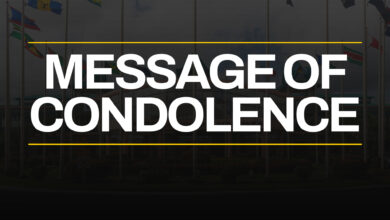Under the theme – Leadership in Partnership – the CARICOM-led Pan Caribbean Partnership against HIV/AIDS (PANCAP) held its Fourth Annual General Meeting from 21-23 October 2004 in Barbados.
The Meeting was managed by a rotating Chairmanship of distinguished Ministers of Health including: Hon. Jerome Walcott, Barbados; Hon. John Maginley, Antigua and Barbuda; Hon. John Junor, Jamaica; Hon. Damien Greaves, Saint Lucia; and Dr. the Hon. Douglas Slater, St. Vincent and the Grenadines.
Representation at the Meeting included other CARICOM Member States, as well as States and Territories of the wider Caribbean, partners on HIV/AIDS Prevention and Control Activities and Donor Agencies.
The Meeting was preceded by and received reports from three of the four Sub-Committees established by the Third AGM of PANCAP held in November 2003. These Sub-Committees focused on issues relating to Care Treatment and Support, Prevention, Human Rights and Stigma Reduction, respectively. The PANCAP Regional Coordinating Mechanism (RCM) also convened prior to the AGM.
Under the chairmanship of Assistant Secretary-General, Human and Social Development of the CARICOM Secretariat, Dr. Edward Greene, the Opening Ceremony was addressed by Hon. Jerome Walcott, Ambassador Lolita Applewhaite, Deputy Secretary-General, CARICOM Secretariat, Ms. Yolanda Simon, Regional Coordinator of Caribbean Regional Network Plus (CRN+), and Sir George Alleyne, UN Special Envoy on HIV/AIDS for the Caribbean. The Keynote Address was delivered by Sir George Alleyne, while statements were made on behalf of Dr. the Hon. Denzil Douglas, CARICOM Portfolio Prime Minister with responsibility for HIV/AIDS and on behalf of Dr. Peter Piot, Executive Director of UNAIDS.
The Meeting welcomed the signing of the Letter of Endorsement of the Caribbean Partnership Commitment by Mr. David Holford on behalf of the West Indies Cricket Board (WICB), Ms. Hetty Sergeant on behalf of UNFPA, Mr. Godfrey Xuereb on behalf of CFNI, Mr. Mark Connolly on behalf of UNICEF and Ms. Roberta Clarke on behalf of UNIFEM. This brings the number of institutions and agencies supporting the PANCAP to 74.
The Meeting received an update on the operations of the PANCAP Coordinating Unit with regard to Law, Ethics and Human Rights, which focused on law and policy reform, technical assistance for countries and capacity building activities for People Living with HIV/AIDS (PLWHA). It was also pointed out that an Action Plan in the area of Prevention of HIV Transmission among Young People was developed in collaboration with partners. Focus was also given to information and communication activities of the Unit and to resource mobilisation for regional activities.
Other issues addressed by the Meeting included strengthening regional institutions to respond to HIV/AIDS under the EU funded Project entitled “Strengthening the Institutional Response to HIV/AIDS in the Caribbean (SIRHASC); a proposed consolidation of the PANCAP Coordinating Unit taking into account the agreed priorities for implementing and managing the respective projects on HIV/AIDS under the Caribbean Regional Strategic Framework.
An account of the stewardship of the resources mobilised was also provided, particularly with regard to the PANCAP-GFATM Project valued at over US$12m, and the World Bank support for a Caribbean-Wide Project to Prevent and Control HIV/AIDS valued at US$9m. Among the major outcomes of these programmes is to build capacity and increase implementation with greater impact at the country level.
The Meeting also received a Report from Dr. Carol Jacobs, Latin America and the Caribbean (LAC) representative on the GFATM Board. She urged greater participation in the upcoming meeting of the Board that will be held in Arusha, Tanzania. Members were urged to provide feedback to Caribbean LAC Focal Point at the PANCAP Unit on issues that would be addressed, particularly with regard to acceptance of in-kind donations of pharmaceuticals. It was pointed out that other PANCAP Members appointed to committees of the GFATM were Dr. Peter Figueroa, Dr. Ernest Massiah, and Ms. Beverly Miller.
The Meeting congratulated Dr. Jacobs on the role that she has played as LAC representative on the GFATM Board.
The Meeting welcomed a Report on the Brazilian Response to the HIV/AIDS Epidemic, largely regarded as a success story characterised by a holistic and progressive approach to the epidemic. Further collaboration with Brazil is envisaged, commencing with a visit of a PANCAP delegation to Brazil either later this year or early in 2005.
The Meeting benefited from a profitable engagement with the Donor Partners, who remained committed to HIV/AIDS Prevention and Reduction in the Caribbean and strong in their support for the PANCAP, which was applauded by the international community as a global best practice in the fight against HIV/AIDS.
Resulting from a meeting of donor agencies the following recommendations were approved:
PANCAP should take responsibility for providing a continuous matrix update on financial resources, consideration be given to the harmonisation of donor reporting and resources, formulation of a regional communication strategy, hence a coordination meeting on the issue to be convened by CARICOM in the first quarter of 2005.
The donor partners also proposed that PANCAP undertake all major regional projects as part of the design for rationalisation. In this regard, the PANCAP Coordinating Unit (PCU) needs to place emphasis on the production of an integrated work programme. Donor partners endorsed the proposed consolidation of the PCU.
The Meeting considered reports from four Working Groups: Care Treatment and Support; Stigma Reduction; Information and Communication; and Technical Assistance.
With respect to Working Group on Care and Treatment, the Working group identified the multi-disciplinary services required in the care, treatment and support of PLWHA. It also advised that countries assess their current services based on the identified services. Each country should then develop a structure to efficiently deliver these services on an equitable basis with access for all.
With respect to Stigma and Discrimination, there is need for the engagement of civil society, addressing the feminisation of the disease, sex and sexuality, attitudes of health care providers and the flow of information. There is also need to twin legislation with a supporting environment such as the right to education and to work with cultural mores.
The Meeting emphasised the need to devise a Communication Strategy based on guidelines from the Working Group to be established to make recommendations and report to RCM.
The Working Group on Technical Assistance agreed that the CARICOM Secretariat should coordinate a small team to follow-up on its discussions and make recommendations for the implementation of a Strategy.
The highlights of decisions from the Regional Coordinating Mechanism (RCM) Meeting are as follows:
Structure and Functions of the RCM
In future, the Steering Committee would be referred to as the Regional Coordinating Mechanism for PANCAP.
The Committee has been established (chaired by Mr. Carl Brown, CARICOM and including Dr. Morris Edwards (CCNAPC), Mr. Fideles Williams (Saint Lucia and representative of CRN+, UNAIDS) to –
(a) Review the Terms of Reference of the RCM, its membership, organization and impact and recommendations for the necessary improvements in these areas;
(b) Examine the structure and functioning of the Sub-Committee system, and make recommendations on how best to streamline their work to increase the overall effectiveness of the RCM;
(c) Review the advantages/disadvantages of holding back-to-back meetings of CCNAPC and PANCAP and make recommendations.
An annual Technical Meeting on Care and Treatment is to become a feature of the Meeting of the Sub-Committee on Care and Treatment held in the first quarter of each year.
The proposals for the consolidation of the PCU have been approved in principle and need for resources for 3-4 staff members will be a primary focus for resource mobilisation.
Resource Mobilisation
A special Meeting of the Sub-Committee on Resource Mobilisation is to meet in the first quarter of 2005 to review the nature of funding for PANCAP programmes and evaluate the strategies for funding request in an effort to reduce the financial gap for the CRSF.
Noting that disbursements of both the GFATM and World Bank Grants are to be made presently, the sub-recipient has been urged to ensure timely implementation to avoid all breaches.
There is need to improve the methods of communications and in this regard the recommendations from the Working Group on Information and Communication are anticipated.
A Special feature of the Meeting was the launch of the book – Education and HIV/AIDS in the Caribbean by Professor Michael Kelly and Brendan Bain of the University of the West Indies.
Contact:
Volderine Hackett
vhackett@caricom.org





